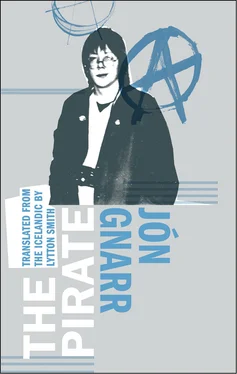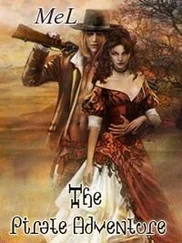It was a huge weight off me when Confirmation and all that related nuisance was over. My Confirmation clothes went into the closet. To my great disappointment, there was no hot dog party. No hot dogs, no Coke, and no Prince Polo candy. Ólaf Skúlason had flat out lied to Eiki the Druggie and me to make us behave. How could I have been so stupid? Like all confirmers, I got the New Testament as a gift. I only read the Book of Revelation. All about the end of the world and the devil. I had amassed all kinds of information about the Book of Revelation from various punk songs. They included, for example, lots of information about the number 666, The Number of the Beast, as the title of the Iron Maiden song goes. You can say that it was thanks to punk rock that I read the Book of Revelation. It was discomforting and thrilling. But after reading it, I did the same thing I did with my schoolbooks I didn’t like and had an aversion to. I set fire to it. Publicly. I went outside with the New Testament, poured gasoline over it, and lit it. I felt it was a definite statement and neatly made clear that I didn’t give a damn about this bullshit.
A few days later my mom announced that I had to put my Confirmation clothes on again because she was going to take me to a Confirmation photo shoot. I resisted, but she was no more willing to budge than on all the other occasions.
“I have Confirmation photos of all my children and you won’t be the exception.”
Mom didn’t listen to my objections, and I went, wearing my Confirmation clothes, to the PhotoStore on Kópavogur with her. To mess up things, however, I’d altered myself. I’d gotten some scissors, gone into the bathroom, and cut my hair into a mess of tufts. I was thinking that all the trouble caused by the Confirmation photo shoot would be called off. But it didn’t change a thing. Mom neatened my hair with hairspray and a comb so that the visible tufts in my new haircut could hardly be seen. My final hope in all this, the little I could do in the circumstances, was to take a firm stand by not letting them take a picture of me smiling like a fool, at least. I would lock my mouth so hard that it wouldn’t show a smile. I was going to be cool, looking on deadpan and appearing really tough in front of the camera. Angry. Cool, tough, not an idiot. I positioned myself with a serious and mean expression in front of the photographer.
“Well, Jón. How are you? You play soccer?”
“No.”
“Are you into sports?”
“No.”
“Well, Jón. Do you like school?”
“No.”
He adjusted the camera and looked through the lens.
“What’s your favorite subject in school?”
“Nothing.”
“Okay.”
He turned away from me and went behind the camera. “What do you want to do when you’re older?”
“Nothing.”
I tried to answer everything with short, terse words. The photographer didn’t react, just walked away from the camera and suddenly brought out this doll he put on his hand, then said really loudly and clearly, in a weird voice, “Hello, Jón!”
I burst out laughing. It was unexpected and funny. And then came the flashes, one after another. I was so damned frustrated. I’d been tricked yet again. In all the images I wouldn’t look tough but like an idiot laughing in a suit. What crap! The proof was when Mom came home with a print of the picture. There was the punk himself, Jónsi Punk, in a brown suit and tan shirt with dorky glasses like the politician Þorstein Pálsson and, on top of it all, grinning like a loon! An embarrassment. I was embarrassed right down to my toes by the picture and hoped it would go straight into a drawer. Mom had another idea, though, and put it up neatly in the living room in front of everyone’s eyes. I fiercely protested this injustice.
“I’m going to throw away this damn picture!”
“I want the picture, so you’ll leave it alone,” she commanded.
I hated my Confirmation picture. Every time I walked into the room, I put the picture down. Mom put it back up again immediately, and the two of us did this several times a day for weeks without talking about it.
“I’m going to destroy this image.”
“You can just destroy it if you like. I have the negatives and I’ll just make more pictures.”
It was a losing battle. Injustice had won out once again.
We were always trying to get ourselves money. I was constantly struggling to get money from my parents to go to the movies or just to do anything. Mom usually didn’t have any money. Dad was in charge of the money at home, and he sat on wealth like a dragon on a heap of gold, giving out really limited amounts to me and Mom. Mom absolutely refused to be an intermediary between Dad and me when it came to money — she wasn’t going to do it. Money had great “sentimental value” for Dad. Maybe it was because he was brought up in such poverty and wanted to be responsible for monetary policy. When a situation came up where I badly wanted something that mattered to me and I didn’t have money to buy it, I always tried to talk to Mom first.
“Mom, can I have money to buy punk cards?”
“Punk cards? Why do you need them?”
“Oh, well, there’s some pictures of bands I want. They’re cool.”
I knew I would get the same answer as always.
“Talk to your father.”
Often, I gave up there. Sometimes, however, I wanted to have something badly enough that it was worth talking to Dad.
“Dad, can I get some money from you?”
It was like I had hit him in the face with a wet rag. Silence. Whenever it came to discussions about money, Dad changed, became sad, maudlin, emotional, and worried. It was as if he wanted awfully badly to say something terribly important about money. Something that would be the ultimate truth about money — but he couldn’t find the right words or didn’t know quite what he was meant to say. He just got a weird look on his face, blinked his eyes continuously as though he were about to cry, then reached out for my hand. So began the same predictable play we had rehearsed so often. He held his hand outstretched in the air, and I put my palm in it. He squeezed my hand, rolled back his eyes with a thoughtful expression, and racked his brains. Sometimes he was even watching TV, and he’d squeeze my hand tight as he stared fixedly at the TV. For ages. I felt like the situation sometimes lasted an eternity. Maybe it was no more than a few minutes. But the minutes passed in a tense, absolute silence. The situation always continued until I repeated the question in an even more wretched tone. Beseechingly.
“Can I have some money?”
Then he’d move his head slightly like it was almost too much for him and he was overcome by grief, and he would say without looking at me:
“Money.”
Then he thought in silence a while.
“What will you do with the money?”
I felt the tension build up in my chest, and I swallowed repeatedly.
“Buy punk cards.”
“Huh?”
It was so alien to him that he could hardly repeat it.
“Punk cards?”
The question implied that he thought it completely unintelligible and, moreover, entirely unnecessary. The words didn’t have any real meaning for him. I might as well have spoken gibberish:
“Ramalala.”
“Huh, didn’t I give you money yesterday?”
“Uhh, no.”
“Come now, when did I last give you some money?”
“On Saturday.”
“On Saturday?” he asked, skeptical.
“Sure, you gave me money for the movies.”
“And you need more money?”
We ended up in this scene over and over again. He looked at the television and squeezed my hand, and I stood embarrassed by his side. Sometimes he squeezed so hard that it hurt. How hard he squeezed bore some correlation with how difficult it was to discuss. For example, depending on how high the amount in question was, the harder he squeezed my hand. Several times he even cried for real. Money just had so much “sentimental value.”
Читать дальше











